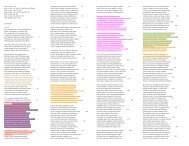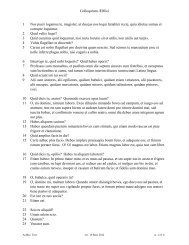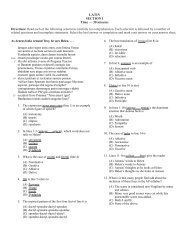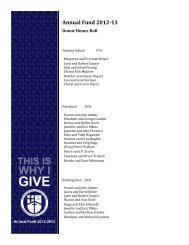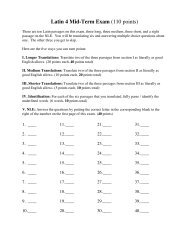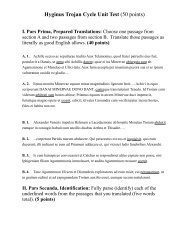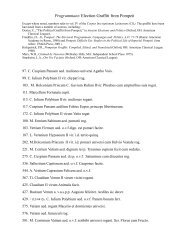Adolescence: The road toward autonomy By Robert A. Horak Jr., Ph ...
Adolescence: The road toward autonomy By Robert A. Horak Jr., Ph ...
Adolescence: The road toward autonomy By Robert A. Horak Jr., Ph ...
Create successful ePaper yourself
Turn your PDF publications into a flip-book with our unique Google optimized e-Paper software.
<strong>Adolescence</strong>: <strong>The</strong> <strong>road</strong> <strong>toward</strong> <strong>autonomy</strong><br />
<strong>By</strong> <strong>Robert</strong> A. <strong>Horak</strong> <strong>Jr</strong>., <strong>Ph</strong>.D., Counselor and Beamer Carr, Student Body<br />
President<br />
<strong>Adolescence</strong> can be a dreaded time for both parents and youth as changes erupt.<br />
During adolescence, however, qualitative changes present new opportunities for children<br />
as they develop powerful cognitive abilities, sophisticated social skills, and experience<br />
dramatic physical transformations. Throughout this period, many parents would agree<br />
that their goal is to mold their child into a “perfect” adult, typically with such traits and<br />
behaviors as the capacity to develop intimate relationships based on mutual respect and<br />
trust, the execution of ethical decision-making based on personal values, responsibility<br />
to self and others, the coping with stress and adversity in a healthy manner, and the<br />
making of a contribution to the greater community.<br />
It’s difficult, however, to know how to help your children develop into such well-rounded<br />
adults. Perhaps the single most important thing parents may do to help their children<br />
through adolescence is to make a conscious effort to maintain an open relationship with<br />
them. This is essential if parents intend to be tuned in with their children. <strong>By</strong><br />
maintaining an open and trusted relationship, parents can play an active role in their<br />
children’s lives. When parents demonstrate that they will always be available to talk,<br />
listen, and give advice, they build a greater sense of safety and security in their children.<br />
Knowing that they have a parent to fall back on in hard times can help children feel more<br />
confident. Confidence, in turn, is a commodity that helps adolescents make<br />
commitments and deal with ambiguity. Another benefit of upholding a strong bond with a<br />
parent is that it can serve as a model to be emulated in developing positive friendships in<br />
the future.
Parents also must teach their children how to use the freedom that increases as young<br />
folks progress through adolescence. Along with freedom comes the ability to properly<br />
use the freedom, which boils down to responsible and ethical decision-making. With an<br />
increased sense of responsibility, children can gradually be granted more freedom. But,<br />
as a parent, how do you know when your child is mature enough to handle more<br />
freedom? Every child matures at a different rate, but if parents are knowledgeable of<br />
their children’s strengths and weaknesses, parents can accurately gauge when their<br />
children are ready to take on additional responsibilities. <strong>The</strong> key for parents is gradually<br />
to ease their children into accepting new responsibilities. However, giving their children<br />
new freedom doesn’t mean that parents should assume that their children would always<br />
use perfect judgment. <strong>The</strong>refore, parents walk the fine line of knowing when to step in to<br />
help and when to let their children figure out how to deal with the situation themselves.<br />
This is where it would be a mistake to underestimate the value of natural consequences.<br />
Natural consequences are potent means critical for skill development and improved<br />
decision-making.<br />
We may conclude that neither extreme, too much or too little freedom, is desirable<br />
because it does not allow children to learn from their mistakes. While becoming young<br />
adults, children will use poor judgment, make bad choices and abuse their<br />
independence, however, it is how such deviation is handled that will determine if children<br />
ultimately can remain on the correct path to <strong>autonomy</strong> in adulthood. Properly dealing<br />
with the times when children abuse freedom can turn a potentially negative situation into<br />
a positive learning experience. <strong>The</strong>refore, even though parents might give their children<br />
new freedom, it is still their duty to stay active in their children’s life by monitoring them<br />
and remaining open to help guide them. Concurrently, by being able to trust and
communicate with their parents, children can learn from their mistakes and exercise their<br />
will in a smarter and more responsible manner in the future.


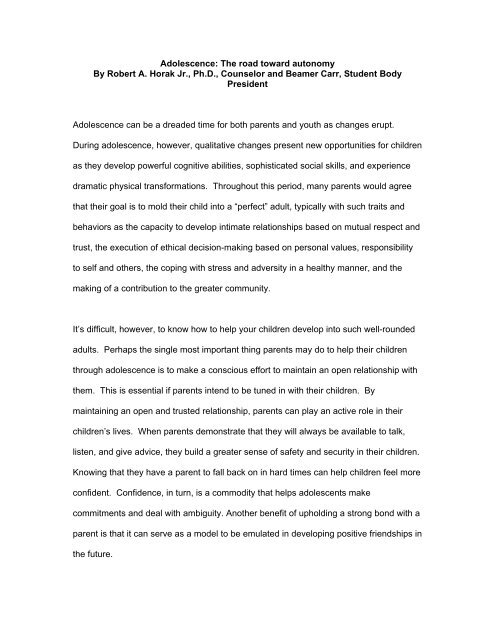

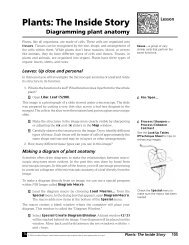

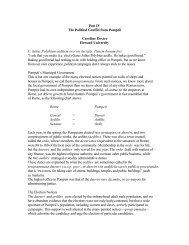
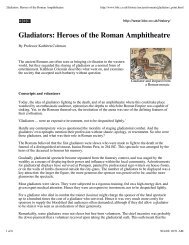
![alumni e-mail addresses by classes - word[3]](https://img.yumpu.com/13381322/1/190x245/alumni-e-mail-addresses-by-classes-word3.jpg?quality=85)
